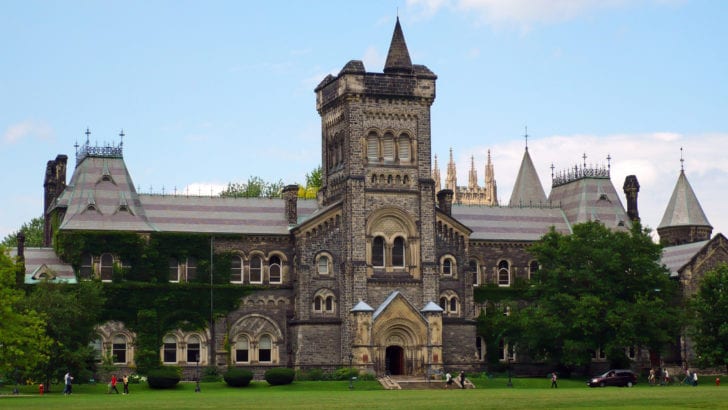The University of Toronto recently rescinded an employment offer to a scholar because an Israel partisan objected.
More than a thousand academics and lawyers have signed an open letter calling on academic and government institutions around the world to cease subjecting those defending justice for Palestinians to censorship and penalties…
A Canadian University rescinded a job offer after an Israel partisan complained… in the U.S. there have been 1,494 incidents… in France students have been jailed…
By Azeezah Kanji, Dania Majid, and David Palumbo-Liu, reposted from Aljazeera

As lawyers and academics, we are deeply troubled and exasperated by the pervasive repression of speech and scholarship on Palestine. This includes recent reports that the University of Toronto’s Faculty of law rescinded an employment offer to noted international human rights scholar Valentina Azarova, following a complaint by a sitting judge regarding her research on Israel’s occupation policies*.
[Editor’s note: HRW reports: “After the university reversed their decision, the chair of the program’s law faculty advisory committee resigned from the committee. Another member of the hiring panel quit his job with the program and the rest of the faculty advisory committee resigned.”
The Globe and Mail reports that the judge is David Spiro, a donor to the law school and a “former member of the board of directors of the Centre for Israel and Jewish Affairs, an advocacy group.” The Canadian Judicial Council may investigate allegations that Spiro “improperly interfered in the hiring process at the University of Toronto’s International Human Rights Program.”]

Broad climate of suppression
The reported treatment of Azarova is consistent with a broader and intensifying climate of suppression. Lawyers, academics, journalists, teachers, artists, students, activists, and trade unions in Canada have been subjected to smear campaigns, event cancellations, physical violence, professional disciplinary measures, and condemnation by the prime minister and other political leaders for opposing Israel’s gross violations of international law and expressing solidarity with Palestinians. In August, Indigenous CBC journalist Duncan McCue was required to apologise simply for using the word “Palestine” on-air.
The situation in Canada mirrors that of other countries. In the United States, for example, 1,494 incidents taking aim at free speech were reported to NGO Palestine Legal from 2014 to 2019; 74 percent were directed at students and academics at universities. In France, rights activists have been criminally convicted for their support of the Boycott, Divestment, and Sanctions (BDS) campaign pressuring Israel to comply with international law. This criminalisation was recently condemned by the European Court of Human Rights as a violation of freedom of expression.
The clampdown threatens to be further exacerbated by the institutionalisation of the International Holocaust Remembrance Alliance (IHRA) definition of anti-Semitism.
As a 2018 letter from more than 40 Jewish organisations around the world warns: “The International Holocaust Remembrance Alliance (IHRA) definition of antisemitism, which is increasingly being adopted or considered by western governments, is worded in such a way as to be easily adopted or considered by western governments to intentionally equate legitimate criticisms of Israel and advocacy for Palestinian rights with antisemitism, as a means to suppress the former.” A statement signed by more than 400 academics opposes the implementation of this definition in Canada for this reason.
[Editor’s note: For more information on the IHRA definition see: “International campaign is criminalizing criticism of Israel as ‘antisemitism’”]
Even the original drafter of the IHRA definition, Kenneth Stern, has cautioned against “enshrin[ing] this definition into law” due to the danger of legally conflating anti-Zionism and anti-Semitism. Yet Ontario’s Bill 168 proposes to do precisely that, by mandating the use of the IHRA definition to interpret anti-discrimination and anti-hate laws. Motions to adopt this problematic definition have also been tabled in municipal councils across the country.
The intensification of speech repression coincides with the intensification of Palestinian oppression and dispossession, with Israel’s planned formal annexation of Palestinian territory – denounced by 48 UN human rights experts as the “crystallisation of an already unjust reality.”
In the face of these gross and flagrant transgressions, it is vital that the space for scholarship, speech, and activism in defence of the most basic rights of Palestinians be preserved. This includes the work of scholars such as Azarova. It is highly perturbing when academic institutions and law faculties – instead of protecting free speech and fundamental rights – are participants in the suppression.
We call on the University of Toronto Faculty of Law to restore Azarova’s employment offer and issue an apology. We also call on the Canadian Judicial Council to investigate the conduct of the judge who complained about Azarova’s appointment. And we call on all academic and government institutions to cease subjecting those defending justice for Palestinians to censorship and penalisation.
Signatories:
- Judith Butler: University of California, Berkeley
- Diana Buttu: lawyer, University of Toronto Faculty of Law alumnus
- Noam Chomsky: Laureate Professor, University of Arizona; Institute Professor (emeritus), MIT
- Angela Davis: Professor Emerita, UCSC
- John Dugard SC: Emeritus Professor of Law, Leiden and Witwatersrand; former Judge ad hoc, International Court of Justice
- Noura Erakat: Assistant Professor, Rutgers University-New Brunswick
- Richard Falk: Milbank Professor Emeritus of International Law, Princeton University
- Mireille Fanon-Mendes-France: former UN Expert on People of African Descent
- Leilani Farha: former UN Special Rapporteur on the Right to Housing (2014-2020); Global Director, The Shift
- Guy S Goodwin-Gill: Professor of Law, University of New South Wales; Emeritus Professor of International Refugee Law and Emeritus Fellow of All Souls College, University of Oxford
- Ghada Karmi: doctor; author; former Research Fellow, Institute of Arab and Islamic Studies, University of Exeter
- Robin DG Kelley: Gary B Nash Endowed Chair in US History, UCLA
- Viet Nguyen: University Professor, University of Southern California; Pulitzer Prize winner, Literature
- Ilan Pappe: University of Exeter
- Avi Shlaim: Emeritus Professor of International Relations, University of Oxford
Full list of 1300+ signatories can be viewed here.
*University of Toronto denies an official employment offer was ever made to Valentina Azerova
The views expressed in this article are the authors’ own and do not necessarily reflect Al Jazeera’s editorial stance.
Azeezah Kanji is a legal academic and writer based in Toronto.
Dania Majid is President of the Arab Canadian Lawyers Association (ACLA).



